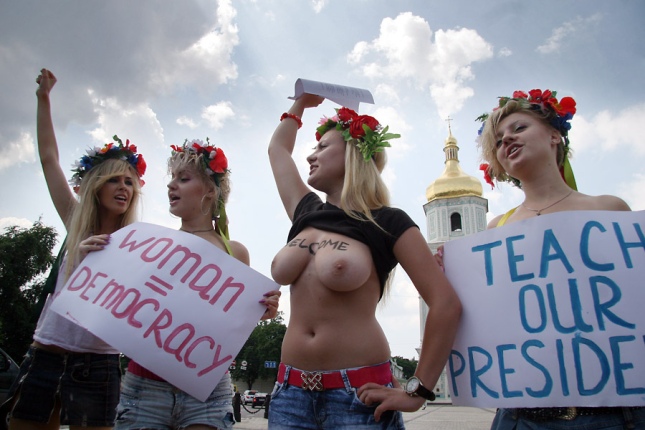A rather interesting article crossed my path a while back. Kira Cochrane writes in The Guardian on the rise of Femen, a controversial feminist group adopting visual methods to condemn perceived female oppression in society. They confronted Silvio Berlusconi as he cast his vote in the Italian Elections last February – topless; chopped down a landmark wooden cross in Kiev to express support for Pussy Riot – topless; and protested outside the Vatican during Friday prayers in support of gay rights – topless. Sensing a theme here?
It got me thinking about the broader state of the feminist movement in the 21st century. Undoubtedly there has been true progress for women since the foundation of modern-day feminism, but is that really down to self-acclaimed feminists, or actually in spite of them?
How much does society change when a group of protesters exhibit their bare breasts in front of the world media? Intentions aside, the ensuing debate is inclined to focus on their tactics, rather than on what the tactics are meant to prompt. In fact, all it does is split the feminist movement ever greater – Femen coin their actions ‘Sextremism.’
Division would be the key word to associate with 21st century feminism. That’s not to say that Femen’s work is particularly wrong. It’s a ballsy experiment from a group of women who believe their cause has stagnated, and rightly so. Feminism is a dirty word within the mainstream. This is largely a result of failing to shake off an unflattering cliché.
To find out why Feminism has stagnated as a cause I asked a middle-aged woman, 47, whether she would describe herself as a Feminist. The reaction was instantaneously a no. Yet she went on to list how patriarchy unfairly dominated society: the most passionate plea was how she is expected to take care of children to a larger extent than her partner even though they both work. Seemingly the eradication of these assumptions is exactly what the feminist movement is there to fight. So why not count herself as a feminist?
“The word has become associated too much with hard politics. It’s a political extreme to describe yourself as a feminist.”
On this point, I would urge Feminists to work harder in coordinating their efforts. This sort of political cohesiveness has worked for the global LGBT movement. Gay rights campaigners led efforts to educate people about AIDS in the 1980s, became increasingly active on promoting transgender issues during the 90s, and this century have led successful campaigns on intersectionality and same-sex marriage. Considering it took until 1990 for the World Health Organisation to remove homosexuality from the International Classification of Diseases, the LGBT movement has progressed supremely well in the 21st century.
I can only aim to address this subject from my (male) point-of-view. From that perspective, it seems clear that Feminism doesn’t have to be particularly radical in 2013 and beyond. Laws concerning gender are well in reach of equality in the western world. The biggest hurdle left is tackling outdated thought and assumptions. For this task, Feminism doesn’t have to be the domain of woman.
Society and politics need strong factional movements in order for the norms of community to be challenged. Feminism is vital to the health of our long-term political dial. At the moment, it seems that Feminism itself is on life support.

